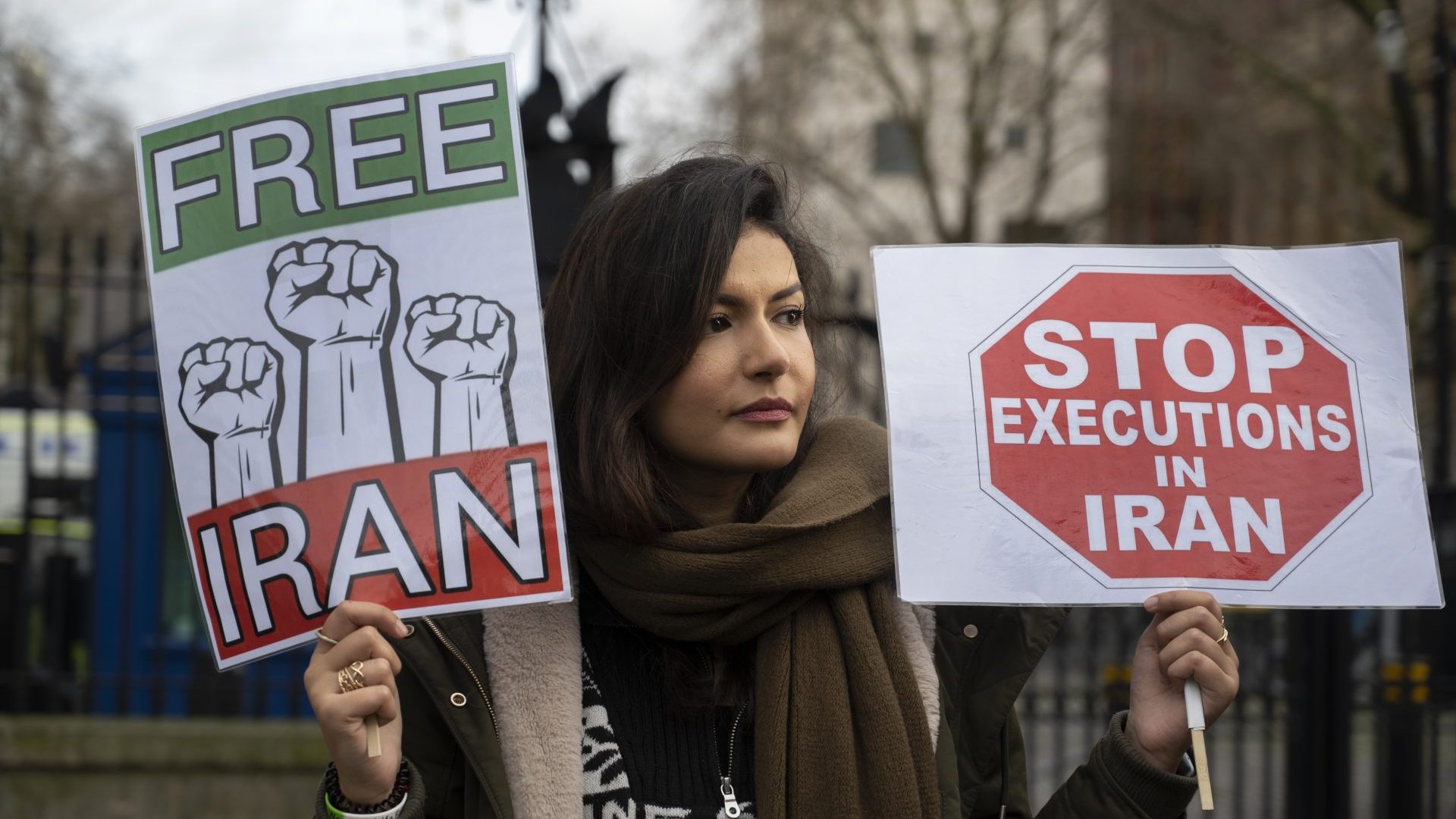Tehran’s increasingly brutal use of lethal force to suppress a popular civil rights movement, its provision of deadly drones to Moscow for Putin’s war against Ukraine and its abhorrent execution of British-Iranian Alireza Akbari have convinced most Western countries that this is no time to reopen diplomatic talks with Iran’s despotic leadership.
But while our politicians treat Tehran with froideur, elements of our private sector are taking an altogether warmer approach. An undercover investigation conducted in Tehran last year revealed a wide range of European companies doing business with the Iranian oil and gas sector, flying under the radar of sanctions regimes imposed by both the US and EU.
What are the consequences of this covert trade, does it matter and what should we do about it?
2022 was a severe wake-up call for the democratic West. It was the year when NATO finally kicked into gear following years of division and apathy in the face of Russian aggression. It was also the year when the West’s strategy of reforming the Islamic Republic of Iran through appeasement fell apart, perhaps for good.
For years, European and American foreign policy vis-a-vis Iran had been dominated by the view that the Islamic Republic’s many vices – its brutal oppression of its own citizens, its status as the world’s foremost state-sponsor of terror, its reckless pursuit of nuclear weapons – could be magically wished away through a strategy of propitiating Iran, most notably by reviving the 2015 Iran nuclear deal (aka the JCPOA).
Under the 2015 agreement between Iran and the major world powers, time-limited restrictions were placed on Iran’s nuclear programme (which had the capacity to develop into a nuclear weapons programme) in exchange for sanctions relief.
When the Trump administration withdrew the US from the deal in 2018, claiming it failed effectively to curtail Iran’s missile programme and malign regional influence, Iran began ignoring limitations on its nuclear programme. Since the Biden administration came into office, there have been attempts to revive the deal but without agreement on the steps required to reactivate it. The rationale for doing so in the West was that if only Iran were welcomed back into the fold of respectable nation states and given access to international markets, its malign and cankerous qualities would simply wither away, or so the argument went.
As we enter 2023, that argument is in tatters.
First came the death of 22-year-old Mahsa Amini on September 16, 2022, at the hands of the regime’s so-called morality police. Mahsa’s death triggered a nationwide civil rights movement calling for “Women, Life, Freedom”, but Tehran’s only response has been to use lethal force against protesters, leaving scores dead.
Next came the revelation that Tehran is providing thousands of its own manufactured Shaded drones to Vladimir Putin, helping to prop up the Russian tyrant’s faltering assault on Ukraine. These drones continue to pound into civilian infrastructure on an almost daily basis – a clear example of a war crime – as Putin seeks to freeze the Ukrainian people into submission.
Then came the execution of British-Iranian citizen Alireza Akbari on January 14, 2023, after the Iranian regime convicted him of spying for MI6, a charge Akbari denied. The UK’s Foreign Office believes that this is the first time that a dual citizen has been executed by Iran since the 1980s, a major escalation in tensions between the West and the Iranian regime.
Accepting that the Islamic Republic of Iran is beyond reform raises a very important question: if it is the case that Western diplomats should absolutely not be sitting down with Tehran until it substantially alters its behaviour, shouldn’t Western businesses also be severing ties with the Iranian market, especially with sectors and industries closely linked to this oppressive and tyrannical regime?
In theory, Western business ties with Iran do not exist. Sanctions imposed by the United States in 2016 effectively disbarred Tehran’s integration with global markets. However, the lure of quick, which is not to say ethical, profits has convinced a plethora of businesses surreptitiously to enter the Iranian market, hoping their activity would fly under the radar of Washington’s sanctions regime.
There are fortunately organisations working hard to expose this unethical activity and indeed individuals willing to take serious risks to personal safety to gather evidence.
One such organisation, United Against a Nuclear Iran (UANI), successfully infiltrated the 26th Iranian Oil Show,which took place from May 13-16, 2022, in Tehran. The not-for-profit secured two assets, a local and a foreign businessman. The local businessman was only aware of a cover story. Unlike the foreign asset, the local businessman never realised he was playing a part in the covert operation.
The foreign businessman first had to make it through extensive security checks at the airport, hotel and conference. He then successfully convinced the local asset to part with the much-prized locals-only oil show programme, which contained a treasure trove of information about the international companies who appear to have risked sanctions and reputations to get a slice of Iran’s oil and gas profits.
This is not the first time that UANI infiltrated Iran’s Oil Show, but the 2022 event revealed a surge in the number of international companies – including European, British and American entities – willing to risk potentially severe consequences by pursuing business opportunities in the heavily sanctioned Iranian oil and gas sector.
This is not simply a matter of private international companies trading with private Iranian companies. The Islamic Revolutionary Guard Corps (IRGC) is heavily involved in the Iranian oil and gas sector, and two of its companies, Khatam al-anbia and Sadra, were found displaying at the Oil Show. Doing business in the Iranian oil and gas sector inevitably means sending profits to an organisation which has provoked international outcry for its terror-sponsoring activities and brutal domestic oppression. Many of its senior figures are themselves sanctioned and the IRGC is itself widely regarded as a terrorist organisation.
Perhaps most shocking of all is that some of the international companies found to be doing business in Iran are manufacturers of potentially dual-use equipment and materials – i.e. things that can be used for military as well as civilian purposes.
This includes Italian companies whose machines can be used in the assembly of centrifuges and cascades, and whose electrical solutions could be used in uranium enrichment facilities, a German company that produces precision dosing pumps that are highly relevant in the conversion and reconversion of uranium and an American manufacturer of mass spectrometers, which could be utilised in the Iranian nuclear weapons programme. This but to name a few.
By working with the heavily sanctioned Iranian oil and gas sector, and selling products that could be repurposed for Iran’s nuclear development programme, these companies are recklessly endangering their reputation, their commercial viability and their employees’ livelihoods.
As well as the possibility of triggering American sanctions, the European Union currently retains robust restrictions on the transfer or proliferation of “sensitive goods”, such as those which would have any possibility of contributing to Iran’s nuclear programme.
It is incumbent on those who want to see sanctions effectively enforced that these companies be required to detail transparently the extent of their trade with Iranian entities, in order to ensure they are not in violation of existing sanctions.
However, of all the international companies found to be doing business in Iran, not one has made a public announcement about their ties to Iran either in public communications or messages on their website. Evidently, the individuals running these businesses understand full well that what they are doing is legally dubious and would prefer to avoid any scrutiny. In the context of Tehran’s ongoing suppression of civil rights protesters and provision of drones to Russia, such behaviour is beyond reprehensible.
Existing sanctions have put pressure on the regime, but for the most part its response has been to seek new ways of evading sanctions rather than to negotiate with the West in good faith to secure readmission to international markets.
Illicit oil remains the lifeline of the regime, and it is only by clamping down on its sanction evasion tactics that the Islamic Republic will be forced to come to the negotiating table with real intent. Without international companies playing their part in making this happen, instead of undermining sanctions, a nuclear deal with Iran will remain out of reach. And rightly so. Investigative journalists could have a field day in laying bare the activities of the companies prepared to engage in moral ambiguity in dealing with Iran.
Sir Ivor Roberts was British ambassador to Yugoslavia, Ireland, and Italy










